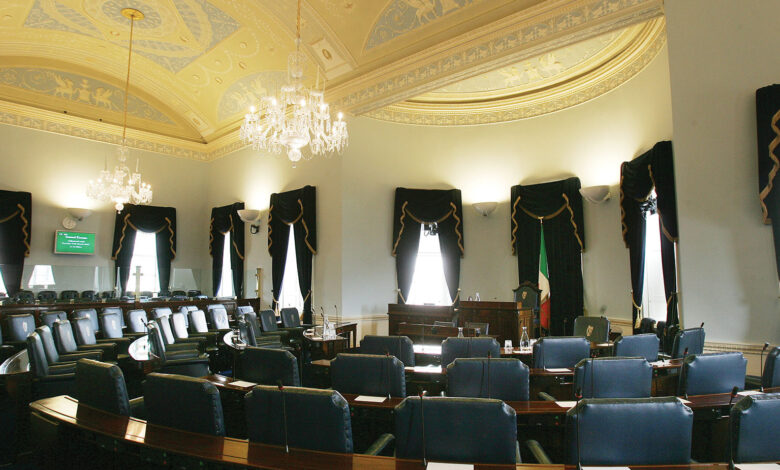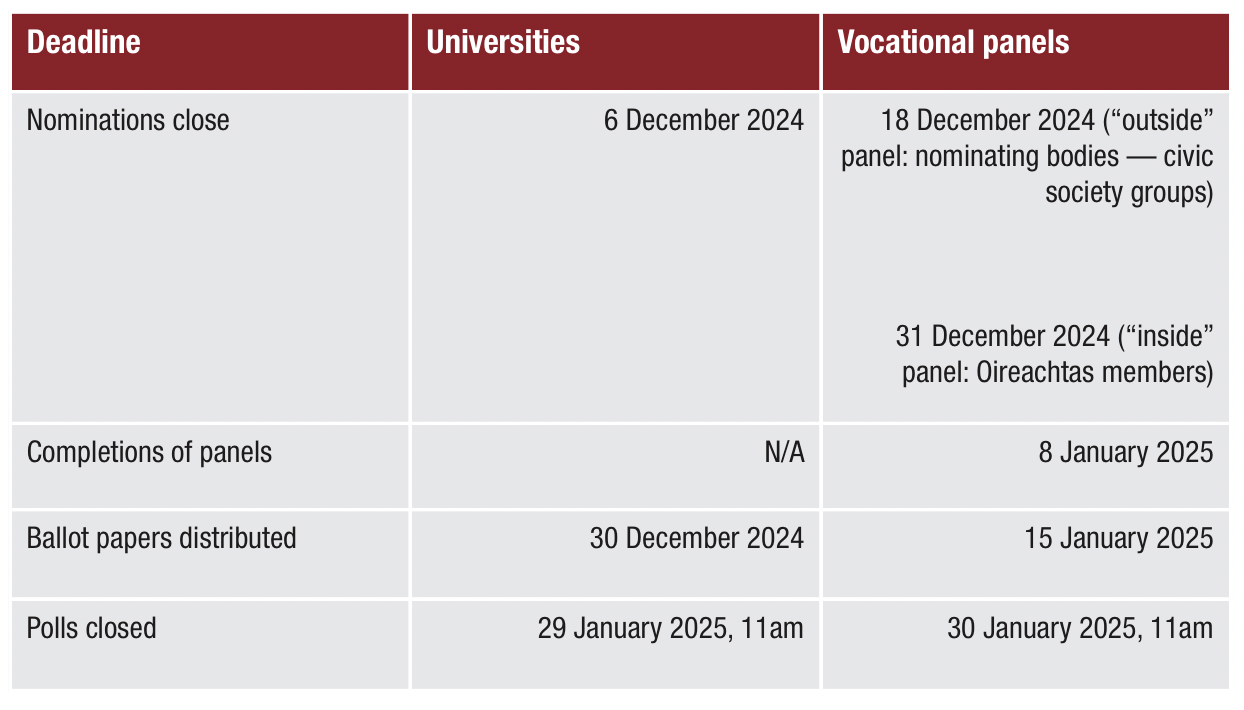New Seanad to be elected in January 2025

Elections to Seanad Éireann are to take place at the end of January 2025.
Seanad Éireann is made up of 60 senators, who sit for a period of no more than five years. To become a senator, one must be a citizen of Ireland and be 21 years of age or older. Of the 60 seats, 49 are elected – 43 from panels and six from universities – while the remaining 11 seanadóirí are appointed by the Taoiseach.
Three TDs who lost their seats at the 2024 general election have been appointed to the Seanad by the Taoiseach Simon Harris TD. They include Fianna Fáil’s Anne Rabbitte and Joe Flaherty, and Fine Gael’s Alan Farrell. They will replace Emer Currie; from Fine Gael, and Erin McGreehan and Timmy Dooley; from Fianna Fáil.
The 43 panel members are elected from five panels, with the candidates being experts or knowledgeable within the areas. The five panels are:
- Cultural and educational panel (five seats): National language and culture, literature, art, education, law and medicine.
- Labour panel (11 seats): Labour, whether organised or unorganised.
- Agricultural panel (11 seats): Agricultural and allied interests and fisheries.
- Industrial and commercial panel (9 seats): Industry and commerce, including banking, finance, accountancy, engineering and architecture.
- Administrative panel (seven seats): Public administration and social services, including social activities.
Members of these panels are chosen by Oireachtas members, as well as representatives of local authorities and graduates of certain universities.
Six of the seats are elected directly by university graduates – three from the National University of Ireland graduates, and three from University of Dublin (Trinity College) graduates.
While the full list of nominations will not be available until January 2025, some notable personalities have been declared with candidacy. Former Minister for Children Katherine Zappone will seek election to the Trinity College Dublin seat, as will outgoing Minister of State Ossian Smyth, and former Lord Mayor of Dublin, Hazel Chu.
Seanad election 2025 timeline

In the National University of Ireland constituency, outgoing senators Alice-Mary Higgins, Rónán Mullen, and Michael McDowell are all seeking re-election.
The Seanad, unlike many upper houses in other countries, does not have the power to block legislation, and only has the powers to delay a bill by up to 90 days.
Indeed, only on two occasions has the Seanad voted against a bill which was passed by the Dáil. In 1958, Taoiseach Éamon de Valera proposed a first-past-the-post electoral system which could have increased Fianna Fáil’s majority in the Dáil. Whilst this bill was passed in the Dáil in 1959 by a majority of 19, the Seanad rejected the Bill by a majority of one.
Despite this opposition, the Dáil availed of its power to pass legislation which had been rejected by the Seanad after 90 days, with the proposal eventually being defeated in a referendum in 1959.
Nevertheless, the Seanad does play a role in refining and improving the laws passed in the State, with a notable example being the 150+ pages of amendments it added to the Planning and Development Act 2024.
Democratic deficit argument
On the backdrop of any Seanad election comes the repeated argument that the Oireachtas upper chamber represents a democratic deficit in Irish politics – something that has been given merit by political representatives, commentators and heads of government.
However, there are two different ways to get on the ballot paper, either by being nominated by four members of the Oireachtas informally (the inside panel) or by a recognised nominating body (the outside panel.)
This brings complications when it comes to the count, with a quota system that requires a certain amount of winners to come from each of the two panels. In a five-seat panel for example, at least two must come from each of the two sub-panels. This can result in a candidate for election being eliminated, while someone with fewer votes can survive and eventually get in to the chamber.
There have been attempts to modernise the Seanad as seen with the Government’s Seanad Electoral (University Members) (Amendment) Act 2024, which extended the voting rights for the six university seats in the upper chamber to graduates of all third-level institutions in the State, following a Supreme Court ruling.
However, the Supreme Court’s judgement means that the Oireachtas must remedy the unconstitutional provisions of the 1937 Seanad Electoral Act, requiring that the change is in place by the end of May 2025.
This means that while the Act has been signed into law by President Michael D Higgins, it will still have no effect on the upcoming Seanad election, and it also means that the next Seanad Éireann will sit another term before any provisions within the act are implemented.





